MINISTRY of Health Permanent Secretary for Technical Services Professor Luckson Kasonka says going forward, government will stop consuming medicines on credit.
In an interview, Prof Kasonka said buying medicines in a haphazard fashion like it was done before would not continue.
“We do hope that in the long term, issues of medicine will be history. Medicines are supposed to be in the hospitals at all times and I have never hidden this, this is my conviction. But the way it was done before where medicines were bought in an haphazard fashion, firefighting is what we don’t want. We didn’t incur those debts, we don’t want going forward to be consuming medicines on debt, no. And we will be engaging the Ministry of Finance ahead of time to tell them that ‘oh, the medicines are running out, please release money’. So, as soon as you purchase, within 30 days we pay the suppliers. Our friends were not doing that, they were just told ‘bring’, some of those things, maybe they were not even being delivered, but they were billing anyway, generating invoices, so we found a lot of debt,” Prof Kasonka said.
“And it is difficult to know whether all those debts can be matched with the supplies, you have seen how difficult it has been for us. We don’t want that again. We want every supplier who supplies to be paid so that they go back quickly and produce. As they produce we hope that they are creating employment, they are employing our people. By government doing business with our local manufacturers, our local companies will generate employment and this is what the President has been saying.”
He said government was considering to stop the importation of most medicines so that they could be produced locally.
“It is not that everyone should be employed by the Ministry of Health or employed by the Ministry of Education, no. It is the ministries generating employment by supporting local companies to stay in business. For example, those who are producing medicines, in fact, we want to stop importation of most medicines. These essential medicines like paracetamol, antibiotics, except for cancer drugs which are extremely difficult because of the technology involved, they are extremely difficult to produce. Many others we should be producing them here in Lusaka, in Ndola,” said Prof Kasonka.
“That is why we are having all those MFEZ (Multi-Facility Economic Zones), is to have plants producing medicines here and that way, we will contribute towards employment creation because all these companies will be generating income as long as we pay them, not in nkongole (borrowing). We found nkongole but we have to pay ultimately because we took up these offices and we took up the problems we found as our own, so those are our problems now after we took them up. We found nkongole more than K2.5 billion. Over time the government will have to pay.”
























